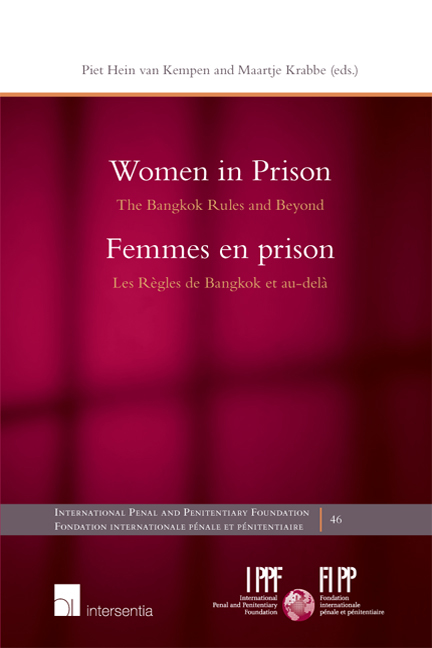Book contents
- Frontmatter
- Foreword
- Avant-propos
- Acknowledgements
- Remerciements
- Contents
- Part I Introductory Synthesis and Analyses: 1ÈRE Partie Synthèse ET Analyses Introductives
- Part II Themes: 2ÈME Partie Thèmes
- Women, crime and incarceration: exploring pathways of women in conflict with the law – The case of South Africa
- Variations and growth in the levels of female imprisonment
- Protection of women in prison under the European Convention on Human Rights
- European standards relating to non-judicial protection of women in prison
- Protection of women in prison in Asia: positive developments, weaknesses, opportunities and threats – perspectives from UNAFEI and its participating countries
- Implementation of the Bangkok Rules in Thai prisons
- The design of women's prisons: an architectural perspective on gender-specific needs and realities of female prisoners and main requirements for improvement
- Part III National Reports: 3ÈME Partie Rapports Nationaux
- Appendix The Bangkok Rules: Annexe Règles De Bangkok
- The International Penal and Penitentiary Foundation: History and Purpose
Women, crime and incarceration: exploring pathways of women in conflict with the law – The case of South Africa
from Part II - Themes: 2ÈME Partie Thèmes
Published online by Cambridge University Press: 25 September 2018
- Frontmatter
- Foreword
- Avant-propos
- Acknowledgements
- Remerciements
- Contents
- Part I Introductory Synthesis and Analyses: 1ÈRE Partie Synthèse ET Analyses Introductives
- Part II Themes: 2ÈME Partie Thèmes
- Women, crime and incarceration: exploring pathways of women in conflict with the law – The case of South Africa
- Variations and growth in the levels of female imprisonment
- Protection of women in prison under the European Convention on Human Rights
- European standards relating to non-judicial protection of women in prison
- Protection of women in prison in Asia: positive developments, weaknesses, opportunities and threats – perspectives from UNAFEI and its participating countries
- Implementation of the Bangkok Rules in Thai prisons
- The design of women's prisons: an architectural perspective on gender-specific needs and realities of female prisoners and main requirements for improvement
- Part III National Reports: 3ÈME Partie Rapports Nationaux
- Appendix The Bangkok Rules: Annexe Règles De Bangkok
- The International Penal and Penitentiary Foundation: History and Purpose
Summary
This chapter presents a selection of findings based on the study Hard Time(s): Women's Pathways to Crime and Incarceration by Artz et al. (2011), which was presented by the lead author researcher at the 2014 IPPF Colloquium, “Women in Prison: The Bangkok Rules and Beyond” in Bangkok, Thailand.
INTRODUCTION
What we know about crime, justice and punishment is based almost entirely on frameworks that have been developed to explain the experiences of men. It is widely accepted that, in comparison to literature on the reasons for men's offending, there is a paucity of research aimed at understanding the reasons why women engage in criminal offending and, more specifically, historical factors that influence offending behaviour. Moreover, almost nothing is known about women incarcerated anywhere on the African continent. What little is known about incarcerated women in South Africa suggests that they are among the most socially and economically vulnerable members of South African society. Their backgrounds - marked as many of them are by violence, extreme economic deprivation, and household disruption - point to longstanding failures of social policies to adequately address the needs of poor women. The specific vulnerabilities that these women face, however, and the ways in which these vulnerabilities interact with other risk factors and shape the specific contexts in which women choose to commit crimes, are not sufficiently known or understood. Understanding these distinctive experiences and the needs of women in prison is crucial for the formulation of effective and humane responses to women's crimes, and to minimising the damaging effects of incarceration on children, households and communities.
It is for this reason that the Gender, Health & Justice Research Unit embarked on a study to explore the reasons why women come into conflict with the law and end up in prison. We established the Pathways Project, an innovative, multi-method project designed for women's prison settings. Moving beyond classical criminological studies on prison - where positivist survey methods still dominate - our methods culminated in 55 in-depth narratives of incarcerated women. The “theoretical aim” of this project was to highlight the distinctive nature of female criminality, thereby shifting attention from the all-male focus on crime that has characterised most South African criminology (to date).
- Type
- Chapter
- Information
- Women in PrisonThe Bangkok Rules and Beyond, pp. 73 - 104Publisher: IntersentiaPrint publication year: 2017



